Episode 23
Once upon a time,
there were two handsome Knights who protected and served the citizens of the Kingdom of Angels. Each day these two Knights in blue left their fortress to answer calls of distress from the people of the Kingdom. These Knights did not ride horses, instead they rode in a shiny black and white chariot that was called 1-Adam-12.
One of these Knights had hair the color of strawberries and sunlight, his name was Sir Pete Malloy.
He was the more experienced Knight and he was charged with teaching a younger knight the ways of the protectors. The younger Knight's name was Sir Jim Reed.
On this day, the Knights had answered a distress call from a fair maiden name Abbie Jenks. Miss Jenks had called Pete and Jim because a young princess was locked in a horrible tower with depressing brown walls.
At first Pete and Jim thought Miss Jenks was a kind maiden, but they soon realized that she was a witch in disguise. Miss Jenks did not care about the Princess at all. She only cared about her pet cat, whose milk was being stolen. Miss Jenks suspected that the Princess was stealing the milk. But she was too cowardly to confront the small girl, so she called the Knights in blue to investigate.
The two Knights walked down the dingy hallway and knocked on the door of the Princess' royal apartment.
Princess Charlie Phelps, the most adorable princess in all the land, answered the door. Sir Reed asked Princess Charlie if she needed their assistance.
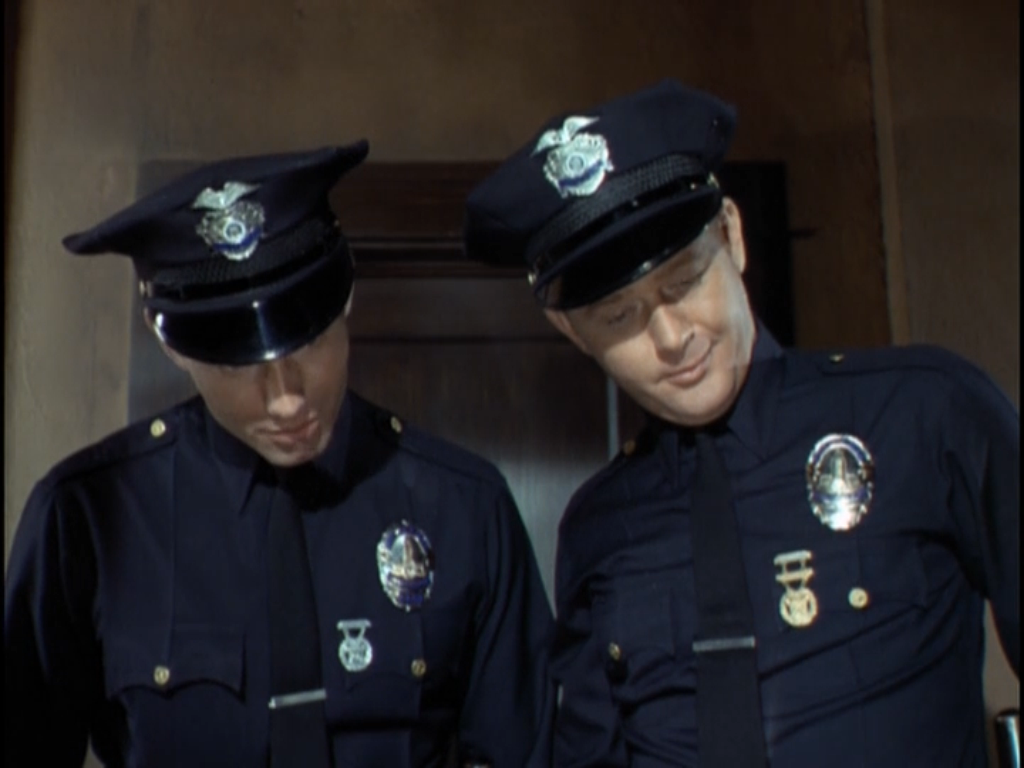 |
| "We heard you might need some help," said Reed. |
 |
| "I'm all right," answered Princess Charlie rather morosely. |
Sir Reed then asked the Princess if the King and Queen were home. The Princess told the Knight that her mommy, the Queen, was away on a royal fund-raising campaign.
The Princess seemed so sad that the Knights knew they must help her. Princess Charlie let the Knights into her messy quarters.
While Sir Reed toured the apartment, Sir Malloy
asked Princess Charlie some questions.
She told Malloy that her daddy, the King did not live with her and the Queen anymore. She also told Sir Malloy that the Queen had been away all night. But Charlie did not seem scared, her mother had stayed away all night many other times.
Charlie loved her mother, Queen Jeannie, and thought she was very pretty. She wanted to make her mother's beauty known to the Knights, so showed them her favorite portrait of the Queen.
 |
| "That's her. She sure is pretty isn't she?" Said Charlie. |
 |
| The Knights agreed that she was one of the most beautiful women in all of the Kingdom. |
Although Queen Jeannie was beautiful, she was an evil queen with extraordinary powers that she used to hurt Charlie. When Charlie was sleeping the Queen cast a wicked spell on her that made Charlie think she looked like a hideous goblin.
 |
| "I wish I were pretty. She doesn't like me very much. She thinks I don't know, but I do." |
Pete and Jim knew that they must rescue the Princess from the clutches of the evil Queen Jeannie.
The Knights believed they had enough evidence to lock Queen Jeannie in a dungeon. But first they would have to prove to the Kingdom court that the Queen was nefarious. They decided to call other Knights to help them in their quest.
Sir Malloy then told Princess Charlie that he and Sir Reed were going to rescue her and take her away to a castle with kind lords and ladies who could take good care of her. But, Charlie did not want to go with the Knights. She was guarding a special secret for the Queen and could not leave the tower.
"I can't, I can't, Cissy needs me."
Her special secret was her sister, Cissy, who was just a babe. The Queen kept Cissy locked in the dirtiest room of royal apartment. Charlie so loved Cissy that she treated Cissy as if she were her very own.
While Charlie was introducing Cissy to Reed and Malloy a man who Charlie called "Daddy" came into the apartment. Even though Charlie called him "Daddy", the Knights could tell that this man was no King. He did not dress like a king or even a nobleman, he wore a scarf which was the mark of a rogue or a knave.
They knew a true King would be upset that his Princess was locked in a tower all by herself. This man did not think it strange at all that Charlie was all alone without the Queen. He admitted that he was not Charlie's true father, he was only a friend of the Queen named Philip Bartell.
 |
| The knights inspect the rogue's identification. |
Reed and Malloy had a feeling that Phil Bartell may be wanted by the Kingdom court, so Sir Reed went to call the Kingdom records keeper on the tower phone while Sir Malloy stayed in the apartment with Bartell. Reed took Princess Charlie with him.
While Sir Reed and Charlie were in the hallway of the tower, Abbie Jenks approached them. She had valuable knowledge about the Queen that she wanted to tell the Knights. Reed told her to share the information with his partner. After Miss Jenks walked away, Charlie told Reed of Abbie's true nature.
 |
| "Know what?" asked the Princess. |
 |
| "What?" asked the Knight. "She's mean," answered the Princess. |
Phil Bartell thought that the Knights were overreacting. He felt that the Queen was doing the best she could, he begged the Knights to leave her and the Princesses alone. Sir Malloy told Bartell that they were obliged to answer all calls of distress.
Reed then re-entered the apartment and informed Bartell that he was wanted by the Kingdom for chariot violations. As he proceeded to place Bartell in restraints, two other Knights arrived to help Pete and Jim. These Knights would take Charlie and Cissy away to the castle with the nice lords and ladies who would help them.
Bartell was worried what Charlie would think if she saw him with his hands cuffed. After all, she thought he was of royal blood. Malloy knew what the Princess would think if she saw him in handcuffs.
 |
| "She'll probably think you're under arrest." |
Malloy and Reed then took Bartell to their fortress. When they arrived, a message was waiting for Malloy. The message was from a nurse who was caring for Princess Charlie. The nurse had discovered cuts and welts on the Princess' back and legs.
 |
| "She's been beaten. More than once," Sir Malloy told his partner. |
 |
| "She told the nurse, 'Daddy did it'." |
The Knights knew that Charlie called Bartell "Daddy" and they suspected that he was guilty of harming the Princess. The followed the procedure as set forth in the laws of the Kingdom and informed Philip Bartell of his rights to remain silent and request legal counsel.
 |
| While Malloy read Bartell his rights, Reed glared at the foppish knave. |
 |
| Sir Reed's glare was really quite frightening. |
 |
| It is said that a young Sir Reed played the sport of football whilst attending university. His opponents on the field must have found him rather intimidating. |
Bartell became confused when the knights read him his rights, he thought this was all about his chariot violations. Sir Malloy let him know that they now wanted to talk to him about more serious crimes.
 |
| "We don't wanna talk to you about a couple of traffic warrants. We wanna talk to you about child beating." |
Bartell denied harming Princess Charlie. He said the Princess must have been mad for saying such a thing. Sir Malloy then received another call, this time from Abbie Jenks. Miss Jenks had called to let the Knights know that Queen Jeannie had returned to her quarters.
While traveling back to the Phelps' tower, Sir Reed mused about what sort of person would hurt a young Princess. Sir Malloy described this type of person to the young Knight.
 |
| "Somebody that can't handle their own frustrations, so they take them out on an innocent kid." |
When they arrived at the tower, Miss Jenks was there to greet them in a nausea-inducing purple and gold op-art ensemble. There were screams emanating from the Phelps' apartment, but Miss Jenks' only concern was her stolen milk. She wanted to know if the knights had questioned Princess Charlie about it.
 |
| "Uh, yeah. We did. She won't do it anymore," fibbed a harried Malloy. |
The two Knights rushed into the apartment and found King Phelps attacking Queen Jeannie. They quickly moved to restrain Phelps.
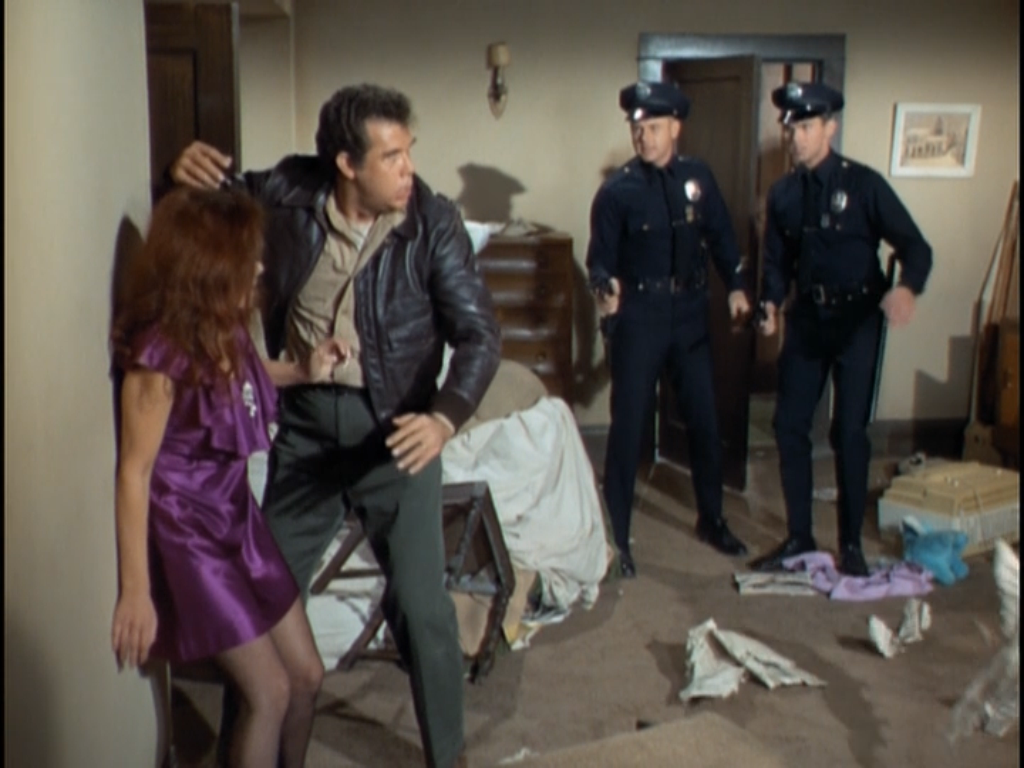 |
| "He was trying to kill me," the Queen told the Knights. |
King Phelps justified his actions by pointing out that he was the King of the Phelps family, which gave him certain rights. Like protecting his daughters. King Phelps then asked Queen Jeannie if she knew the whereabouts of his precious princesses.
The King was surprised to find himself in handcuffs. He was only trying to knock some sense into Jeannie. She was still his wife, even if he didn't live in their royal quarters any longer. He asked the knights if there was a law against a king "knocking some sense" into his queen.
The King was confused by Malloy's reference to child beating, he had never laid a hand on Princess Charlie. He then exposed Queen Jeannie's terrible secret. It was she who had whipped poor Princess Charlie with the cord from a lamp. If he had not stopped her, she may have killed Charlie.
While King Phelps was telling the knights of the Queen's loathsome act of violence against Charlie, the Queen kept shouting that he promised he would not say anything. Sir Malloy's face revealed his disgust with the Queen.
Sir Reed then escorted the fallen King out of his royal quarters and Sir Malloy stayed behind with the evil Queen. She began telling Sir Malloy that she did not hate Princess Charlie, she wanted Charlie to be like her. As the Queen continued to speak it became obvious that she was either mad or addlebrained or under the influence of a potion. Sir Malloy told her it was time to leave her Royal quarters.
As they left the apartment, Jeannie found her portrait amongst the debris of her struggle with the King. She picked it up and examined it, seemingly unaware that the subject of the portrait was herself.
The despondent Queen then took her portrait and hurled it across the room as a sign of her frustration and disappointment with her fall from grace.
Please do not take my light-hearted approach to this episode to mean that I don't appreciate this installment. On the contrary, this is one of my favorites of the first season. I thought the subject matter of a 6-year-old damsel in distress rescued by two dashing officers of the law lent itself to a fairy-tale narrative.
The story presented is nothing like a fairy tale. I'm shocked at how gritty this episode is for a 1960's TV show. There is no sugar-coating of Charlie's circumstances. No euphemisms are used when Malloy and Reed talk about how she was beaten. The apartment is messy and unkempt and the bathroom is filthy. The mother looks cheap and disheveled. There is no happy ending for the Phelps family.
To me, the real stand-out in this episode is Kent McCord. You can sense Reed's affection for the two young girls from his first interaction with Dawn Lyn at the apartment door. You can also sense his revulsion for the adults who have failed Charlie and Cissy. While Malloy reads Bartell his rights, Reed just glares at him and puffs up his chest. Reed's demeanor makes Bartell realize that the situation has suddenly become more serious. Later, his summation in the coffee room, as Pete put it, says it all. His anger and disgust at the adults involved is palpable as he demands answers from Pete.
Martin Milner also does a fine job in this episode. Malloy has seen children like Charlie and Cissy before so he does not get as upset as his young partner. But, his face still conveys loathing at Mrs. Phelps when it is revealed that she has beat Charlie. In the coffee room scene, a melancholy Malloy, knowing that they've done all they can do, tries to refocus his partner's attention to the reports he is writing. His final line communicates a wisdom to this type of situation that Reed has not yet gained.
Fine performances, and dramatic subject matter earn Log 12: He Was Trying to Kill Me a rating of:
Do you agree? See you next time! KMA-367
 |
| "Where's Charlie now? And where's the baby?" Demanded the King. |
 |
| The Queen admitted that she did not know. |
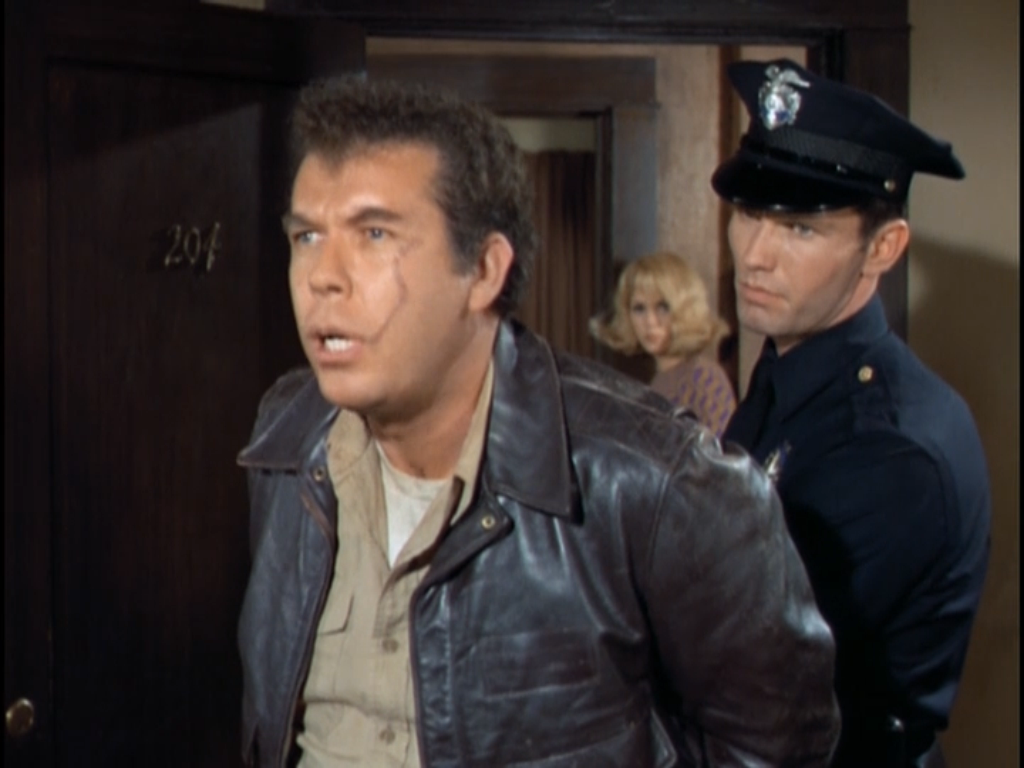 |
| Miss Jenks remained in the hall watching everything that happened in the Phelps' apartment. |
 |
| "That's right there's a law. There's also a law against beating children," Sir Malloy informed the King. |
While King Phelps was telling the knights of the Queen's loathsome act of violence against Charlie, the Queen kept shouting that he promised he would not say anything. Sir Malloy's face revealed his disgust with the Queen.
 |
| "C'mon, Miss Phelps. It's time to go now." |
 |
| "She's beautiful. Isn't she beautiful?" asked Jeannie. |
 |
| "That's what Charlie said, too," replied Malloy. "She did?" asked Jeannie in disbelief. |
Later at the knights' fortress, Sirs Reed and Malloy were in the dining hall writing their reports on the Phelps family. Sir Reed became very upset at how the Queen, the King, and the rogue Bartell had all failed to protect Princess Charlie and Princess Cissy. He looked to his partner, the more experienced Knight for answers.
 |
| "Three people, all supposed to be grown adults and not one of them gives a damn about a six-year-old child and a ten-month-old baby. Not one of them. Well?" |
Unfortunately, even with his extensive history of protecting the Kingdom's citizens, Sir Malloy did not have answer for the young Knight.
 |
| "You just said it all, partner." |
Sir Reed had one last question for his partner, he wanted to know why Princess Charlie lied about who had beaten her. Why did she say her "Daddy" did it when her mother had committed the heinous act? Sir Malloy did have an answer for that query.
 |
| "It's funny, isn't it? She loved her mother." |
This is the end of our tale about Princess Charlie and the Knights Reed and Malloy. In this story nobody lived happily ever after.
The End
The story presented is nothing like a fairy tale. I'm shocked at how gritty this episode is for a 1960's TV show. There is no sugar-coating of Charlie's circumstances. No euphemisms are used when Malloy and Reed talk about how she was beaten. The apartment is messy and unkempt and the bathroom is filthy. The mother looks cheap and disheveled. There is no happy ending for the Phelps family.
To me, the real stand-out in this episode is Kent McCord. You can sense Reed's affection for the two young girls from his first interaction with Dawn Lyn at the apartment door. You can also sense his revulsion for the adults who have failed Charlie and Cissy. While Malloy reads Bartell his rights, Reed just glares at him and puffs up his chest. Reed's demeanor makes Bartell realize that the situation has suddenly become more serious. Later, his summation in the coffee room, as Pete put it, says it all. His anger and disgust at the adults involved is palpable as he demands answers from Pete.
Martin Milner also does a fine job in this episode. Malloy has seen children like Charlie and Cissy before so he does not get as upset as his young partner. But, his face still conveys loathing at Mrs. Phelps when it is revealed that she has beat Charlie. In the coffee room scene, a melancholy Malloy, knowing that they've done all they can do, tries to refocus his partner's attention to the reports he is writing. His final line communicates a wisdom to this type of situation that Reed has not yet gained.
Fine performances, and dramatic subject matter earn Log 12: He Was Trying to Kill Me a rating of:
Do you agree? See you next time! KMA-367





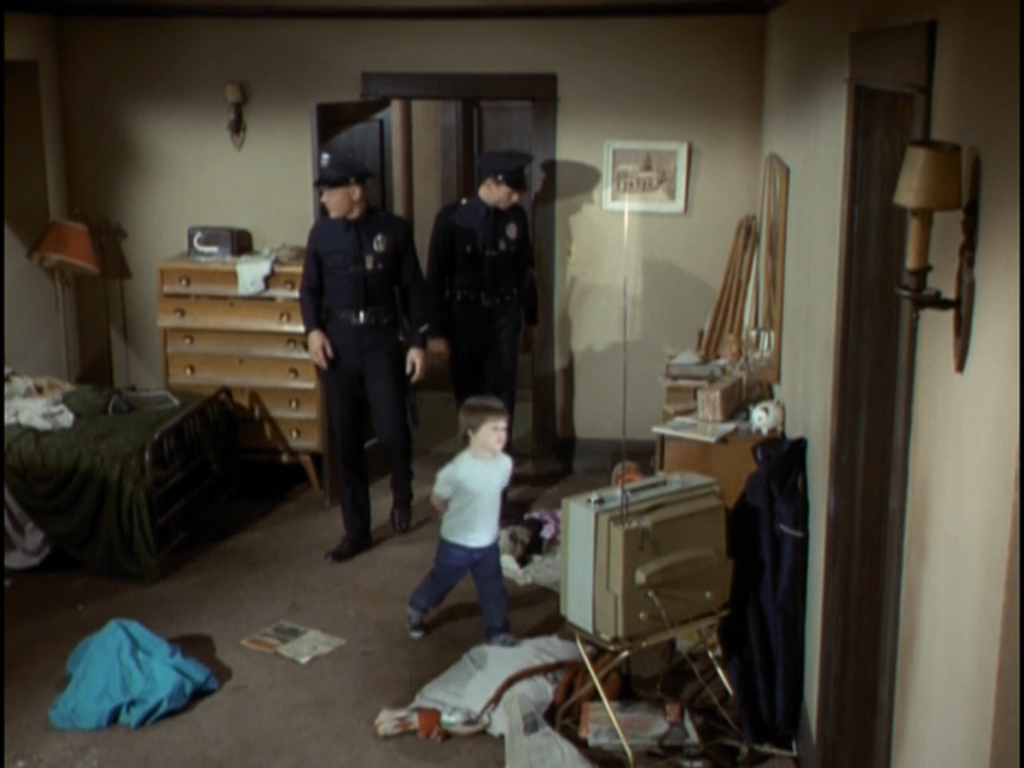


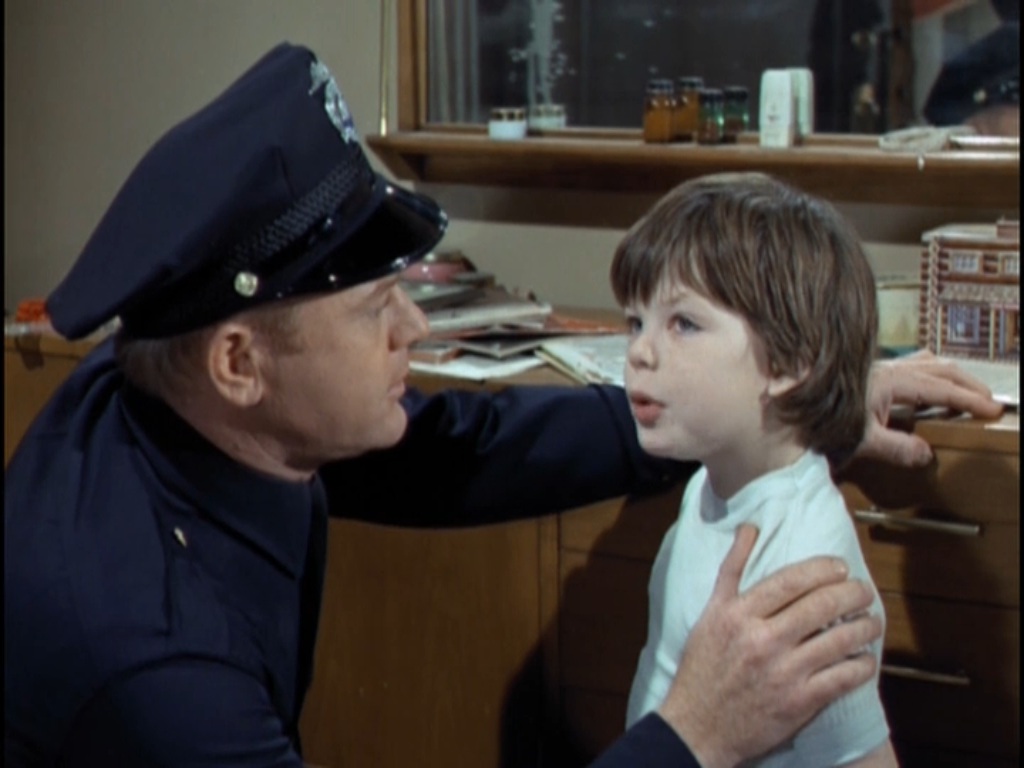







This is a really heart wrenching episode. That Charlie was a great little actress, though. I agree with you that Kent McCord really stood out here. He was great in those scenes with Charlie. I actually thought the same thing in some of the other episodes with kids. He always seemed more at ease to me. In the Christmas episode, I thought that he smile was the most natural in that scene with Harvey. I think it was the episode with the little Scandinavian girl where he also made an impression on me.
ReplyDeleteGreat recap for a sad, but excellent episode.
Thanks, OK-7! Reed always seems to have more patience to deal with children and women, both seem to be a mystery to the bachelor Pete. That smile he gives Harvey is just beautiful. Swoon.
DeleteI agree about the young actress who played Charlie. She was great. She reminds me of another young actress who played Scout Finch in "To Kill a Mockingbird" - I think her name was Mary Baddely.
DeleteShe also played Dodie on the final seasons of My Three Sons. Her real name is Dawn Lyn
DeleteThis is truly a stand-out episode. As you said, nobody but Reed and Molloy come off looking good.
ReplyDeleteThere's the self-absorbed fashion-victim Bartell, who seems to think he's the good guy, when at best he's polite to the kid while he's trying to get laid (Okay, I'm guessing with some success) amid the squalor.
I don't judge Jeannie Phelps for her sexuality, which I think this episode does to some extent ("We want to show what an irresponsible, selfish woman she is. Let's make her a stripper and imply she sleeps around on her husband") but that leaves plenty to judge her for. I wish she hadn't devolved in the end into yet another "Ophelia's Mad Speech" and was allowed the integrity of just being the selfish, neglectful parent she clearly was.
Mr. Phelps isn't much better. While he does seem to have some concern for his daughters -- or at least, an awareness of them -- he's also a caricature of the domestic abuser. I'm surprised he was allowed a leather jacket instead of a sleeveless undershirt.
And of course, rather than a concerned neighbor who cares about the fates of the children, Miss Jenks is just as selfish in her own way. We don't mind her not wanting her milk stolen. We don't even mind that she'd concerned about her cat. I've got five myself, one purring from her perch atop the back of my recliner as I type this. But Miss Jenks' glee in the misfortunes of the Phelps family reveals her, and what it shows is every bit as unlovely as her latter wardrobe.
It's an episode that doesn't pump for easy answers, and doesn't condescend to its characters or audience. Very good stuff.
I think there may have also been some problems in the Phelps family that the episode did not delve into. There was a weird pseudo-sexual competition between Charlie and her mother ("I wish I were pretty like her" "He likes me better") for the affections of either Phelps or Bartell.
DeleteOne of the other things that bugged me about Abbie Jenks, and this is more about the actress than the character, was her mustache. Really, look closely. It's there and it's very distracting. I know they had bleach and wax in 1968, somebody should have told her.
Forsooth, I detecteth not the offending moustache. Perchance there existeth a need for replacement of inadequate spectacles? LOVE your medieval narrative, rendering slightly more palatable this sordidly true-to-life tale. I think Charlie is about the most believable child actress in all of Adam-12. Like a lot of abused kids, her fear of abuse is outweighed by her covert hope that her mother might someday love her. You can tell that she knows better than to really expect anything positive in her life of quiet resignation. Not an uncommon situation in real life, but it's no less tragic. You have to admire and sympathize with LEOs and other people who carry on despite feeling impotent in the face of such ugly reality. Reed's reactions are so touching as he tries to cope. The viewer's heart goes out to him (and to Malloy) almost as much as to the victims in this episode. McCord & Milner at their best!
ReplyDeleteDidn't think they'd ever top episode 17, and there were a few lame episodes in between, but they did it with this one, it still hits hard almost 50 years later. So I found your review a bit incongruous for such a raw emotional episode.
ReplyDeleteBambi Allen who played the mother was a B-grade movie actress who died in 1973 after complications from various silicone operations. She was 34.
I didn't mean any disrespect to the episode, which I liked very much. I just wanted to try something different.
DeleteI love this review and I think it's better than the episode! The episode is good, but I prefer when the guys are out in the real world instead of on cardboard sets.
ReplyDeleteThis episode is an example of how well the storytellers -- the writer (in this case Robert I. Holt, who penned 14 Adam-12s, including the previous I feel Like a Fool Malloy) and director are able to pack so much mood and humanity in a compelling way -- even when the subject matter is repellent. It's hard to believe, after watching it and then reading your excellent retelling of it, that it all occurred in 24 minutes. This is a staple of the series (and other Webb shows), the compact, concise telling of a drama with minimum fanfare or fluff. Some episodes as the series goes on, seem to have barely a page of dialogue for either Reed or Malloy, yet the director is able to draw simple emotions and let Milner and McCord layer the story with reactions and quick replies. A cop's world is not for the windy, long storyteller -- although Joseph Wambaugh was excellent in his way, as i loved Police Story too. Here, they depict some of the muck and pain that the job entails and try to make a couple lives better. It's definitely a top-notch episode. Hope you and your family are doing well (and your Milner mug is still keeping you hydrated!)
ReplyDeleteI didn't care much for the medieval narrative of this post (please don't throw me in the dungeon!) but I applaud you on making the review of such a hard topic a little easier to read.
ReplyDeleteLoved Jim in this one! Seeing him try to make sense of such an injustice while Pete, the more seasoned officer, can only agree with his sentiments. Really makes you stop and think about just how much police officers and first responders have to go through and everything they have to deal with in their careers. It takes a special kind of person.
Okay so, I have never seen this episode. Not even a YouTube clip. I've seen plenty of screencaps, but no videos. All this to say, this entire time I thought Charlie was a boy. It wasn't until reading this blog post and other commenters mentioning the actress that I realized that she was a girl! My bad Princess Charlie :(